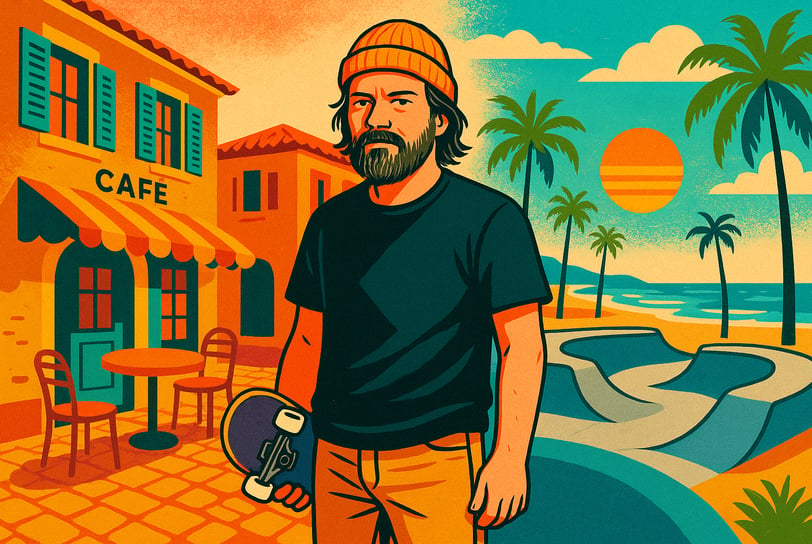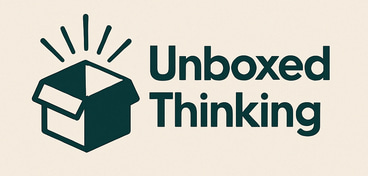Skateboards, Citizenship, and Caution: Thinking Through Identity in a Fractured World
From grunge and Star Trek to Waffle Houses and west coast road trips — a personal dive into nostalgia, evolving politics, and what it means to find clarity (and connection) in a chaotic world.
Oliver
4/19/20254 min read


I was maybe 11 or 12 when I first started dreaming in California. Not literally — I’d never been there — but I soaked it in through the pages of Thrasher and Transworld Skateboarding, those gloriously chaotic windows into another world. I was living in Germany at the time, a long way from any Pacific coastline, but I felt like I knew the vibe already. Loose clothes, palm trees, skateparks under hazy skies. Freedom. Rebellion. That golden glow of possibility that hung around everything American in the 90s — at least through my young, idealistic eyes.
It wasn’t just the boards, either. It was the soundtrack. Beastie Boys, The Offspring, and a healthy dose of grunge. And while we didn’t even have a TV in our home until I was around 12, the shows I eventually latched onto were mostly re-runs on German TV — a mix of American action and beach series that may have aired a bit later for us than in the States. I was drawn to series like Riptide, The Fall Guy, Baywatch (yes, that Baywatch — and look, I was a young boy, so those slow-motion beach runs left a mark), and especially Star Trek: The Next Generation. That show in particular stirred something deeper — a kind of idealism that, even though it wasn’t exactly Californian, I associated with the free-thinking culture orbiting the Hollywood studios. All of it fed this sense that America wasn’t just a place, it was a culture. A mood. A gravitational pull that somehow reached all the way across the Atlantic.
Since then, my geography’s changed a lot. I moved to the south of France at 16, then to Spain after getting married in 2002, and finally landed in Canada in 2006. And while I’ve let go of a lot of my younger assumptions — including some fairly rigid black-and-white ones I grew up with — that early pull toward the American ideal still lingers. I still love visiting the States. Vermont, with its mix of down-to-earth, artistic, and deeply political energy, speaks to me — and its proximity doesn’t hurt. But I also love exploring the New Hampshire and Maine coasts, soaking up the energy of Boston or NYC, and wandering the desert landscapes around Las Vegas. Even Vegas proper has something quintessentially American about it — a surreal boldness, a kind of mythic sparkle that just begs to be experienced from time to time, in small doses. I’m still in love with California, too. I first visited at 19, back in 1996, and yeah — it delivered. The sunshine, the energy, the dream-like quality of it all. But with each visit since, I’ve had moments where I couldn’t quite shake a feeling of fakeness. Like the version of California I’d been sold — by magazines, TV, music — didn’t quite match the one on the ground. It was still beautiful, still iconic, but also tinged with something manufactured. And that realization? It didn’t just apply to California. It started to colour how I saw the American myth as a whole.
Still, there’s a reason I keep going back. Road trips down south — Highway 1, 101, doesn’t really matter — always feel like a dream. And the people? Something special. That warm "honey" from a waitress at a random Waffle House we pulled into — and not just once — it’s one of those spontaneous, sincere human connections that feels uniquely American. It’s the kind of warmth that seems increasingly rare in our fast-paced, disconnected world. Honestly, I wish I could explore even more.
But I’m also not blind. Over the past several years — especially since 2016 — it’s been hard to watch what’s happening politically south of the border without feeling a creeping unease. The erosion of democratic norms, the polarization, the performative cruelty that seems to be gaining ground — it’s made me think harder about what it means to not be American. About what it means to be Canadian. Or European. Or a global citizen. Or all of those things at once.
Canada’s not perfect, obviously. But something about the quieter, more collective tone of Canadian politics — the (at least theoretical) commitment to pluralism, to fairness, to figuring things out together — feels like it’s worth protecting. I didn’t always see it that way. For a long time, I didn’t feel equipped to have a political opinion at all. But lately I’ve been learning. Paying more attention. Starting to develop real preferences — not based on party lines, but on ideas that work. I don’t care much for ideology, but I do care about what’s effective, what brings people together, what actually makes life better for most. That feels political in the best possible way.
At the same time, I worry about the creeping influence of our big neighbour’s political habits. The polarization, the two-party mentality, the way every issue seems to be framed as a zero-sum battle. I’d hate to see Canada drift into that kind of binary thinking — where collaboration becomes a weakness, and politics becomes more about winning than working things out. I want a system where people from all sides can still come to the table. That still feels possible here. And it feels worth fighting for.
But I’ve come to realize that unity — the real kind, not the culty kind — doesn’t come from staying silent. It comes from engagement. From listening. From disagreement, even, but disagreement rooted in a shared sense that we belong to one another in some way. That our fates are connected.
And so lately I’ve been thinking more about what kind of citizen I want to be. Not just legally, but ethically. Emotionally. Do I want to keep skating on the surface of things — nostalgic for a version of America that maybe never really existed — or do I want to dig in where I am? Do I want to help strengthen the country I’ve made my home?
These aren’t easy questions. I still feel that pull toward the open road, the punk rock, the palm trees and fantasy of endless freedom. But I also see the cost of unchecked individualism. And I see the beauty in imperfect attempts at solidarity — even if they’re quiet, even if they don’t go viral.
So yeah. Just thinking out loud. But maybe that’s where a lot of clarity starts.
